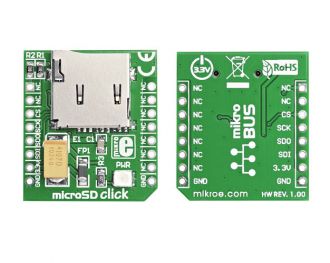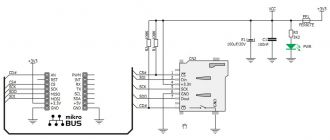
We strongly encourage users to use Package manager for sharing their code on Libstock website, because it boosts your efficiency and leaves the end user with no room for error. [more info]

Rating:
Author: MIKROE
Last Updated: 2019-06-05
Package Version: 1.0.0.1
mikroSDK Library: 1.0.0.0
Category: microSD
Downloaded: 25376 times
Followed by: 5 users
License: MIT license
This project consists of several blocks that demonstrate various aspects of
usage of the MMC_Fat16 library.
Do you want to subscribe in order to receive notifications regarding "microSD click" changes.
Do you want to unsubscribe in order to stop receiving notifications regarding "microSD click" changes.
Do you want to report abuse regarding "microSD click".

Front and back view of microSD click board designed in mikroBUS form factor. mikroBUS is specially designed pinout standard with SPI, I2C, Analog, UART, Interrupt, PWM, Reset and Power supply pins.
View full imageLibrary Description
The library covers all the necessary functions for the usage of the microSD Click board. It holds card detection function.
Key functions:
uint8_t microsd_cardDetection() - Function checks if the user has inserted the memory card.Examples description
The application is composed of the three sections :
void applicationTask()
{
mikrobus_logWrite( "", _LOG_LINE );
mikrobus_logWrite( "________________________", _LOG_LINE );
mikrobus_logWrite( " Begin demonstration! ", _LOG_LINE );
mikrobus_logWrite( "", _LOG_LINE );
mikrobus_logWrite( " Insert microSD Card ", _LOG_LINE );
mikrobus_logWrite( "------------------------", _LOG_LINE );
if( microsd_cardDetection() )
{
mikrobus_logWrite( "Memory card not detected", _LOG_LINE );
mikrobus_logWrite( "------------------------", _LOG_LINE );
}
else
{
mikrobus_logWrite( " Memory card detected ", _LOG_LINE );
mikrobus_logWrite( "------------------------", _LOG_LINE );
mmcErr = Mmc_Init();
if( mmcErr == 0 )
{
mikrobus_logWrite( " MMC Init-OK ", _LOG_LINE );
mikrobus_logWrite( "------------------------", _LOG_LINE );
mmcErr = Mmc_Read_Cid( regVal );
if( mmcErr == 0 )
{
mikrobus_logWrite( "CID : ", _LOG_TEXT );
for( i = 0; i <= 15; i++ )
{
IntToHex( regVal[ i ], logTxt );
mikrobus_logWrite( logTxt, _LOG_TEXT );
}
mikrobus_logWrite( "", _LOG_LINE );
mikrobus_logWrite( "------------------------", _LOG_LINE );
}
else
{
mikrobus_logWrite( " CID-error ", _LOG_LINE );
mikrobus_logWrite( "------------------------", _LOG_LINE );
}
mmcErr = Mmc_Read_Csd( regVal );
if(mmcErr == 0)
{
mikrobus_logWrite("CSD : ", _LOG_TEXT);
for( i=0; i <= 15; i++ )
{
IntToHex( regVal[ i ], logTxt );
mikrobus_logWrite( logTxt, _LOG_TEXT );
}
mikrobus_logWrite("", _LOG_LINE );
mikrobus_logWrite( "------------------------", _LOG_LINE );
}
else
{
mikrobus_logWrite(" CSD-error ", _LOG_LINE );
mikrobus_logWrite( "------------------------", _LOG_LINE );
}
}
else
{
mikrobus_logWrite( " MMC Init-error ", _LOG_LINE );
mikrobus_logWrite( "------------------------", _LOG_LINE );
}
mikrobus_logWrite( " Demonstration over! ", _LOG_LINE );
mikrobus_logWrite( "________________________", _LOG_LINE );
mikrobus_logWrite( "", _LOG_LINE );
Delay_ms( 5000 );
}
Additional Functions :
Other mikroE Libraries used in the example:
SPIMmcMmc_FAT16UARTConversionsAdditional notes and informations
Depending on the development board you are using, you may need USB UART click, USB UART 2 click or RS232 click to connect to your PC, for development systems with no UART to USB interface available on the board. The terminal available in all MikroElektronika compilers, or any other terminal application of your choice, can be used to read the message.

Board is designed to use 3.3V power supply only. On board ferrite voltage supply filter ensures stable operation.
View full image